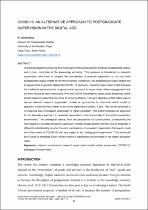COVID-19: An alternative approach to postgraduate supervision in the digital age
Abstract
Universities globally are facing enormous governmental pressure to increase postgraduate output, and in turn, contribute to the knowledge economy. This pressure is transferred to research supervisors, who have to navigate the complexities of research supervision to not only meet postgraduate output targets set by the university in particular, but postgraduate output targets set by government in general. Before the COVID-19 pandemic, research supervision mostly followed the traditional apprenticeship or group model approach to supervision, where engagement took the form of face-to-face interactions. With the COVID-19 pandemic came social distancing, which forced research supervision to move to online platforms. The core objective of this article was to peruse selected research supervision models or approaches to determine which model or approach would be most suited to an online supervision context, if any. This article advances a re-imagined view of research supervision in higher education. The author proposes an argument for an alternative approach to research supervision, most appropriate to the online supervision environment. The ontological stance, from the perspective of constructivism, underpinned the interrogation of selected research supervision models or approaches with the view to engender a different understanding of what the core components of a research supervision framework could be in the context of COVID-19, with due regard to the “pedagogy of supervision”. This article will be of value to emerging South African research supervisors and scholars in the higher education realm.

